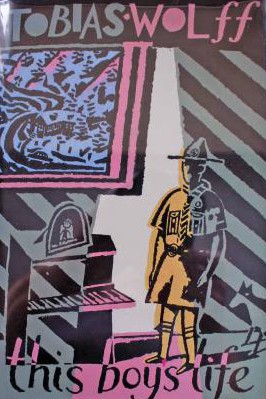Inspiring Older Readers
 posted on 23 Feb 2019
posted on 23 Feb 2019
This Boy’s Life by Tobias Wolff
Wolff’s reputation is founded on his short stories and memoirs and what characterises a lot of his writing is the way these two bleed into each other. That’s not to say that his memoir writing is fictionalised but that he brings the skills of the short story writer to the construction of the memoir so that a book like This Boy’s Life has a compelling, almost unbearable narrative pace which grabs hold of you and doesn’t let go until the end.
Wolff, along with the likes of Raymond Carver, has often been given the rather colourful label of belonging to the ‘Dirty Realists’ – a shorthand that was designed to try and capture the way these authors eschewed any romantic notions of the American Dream, opting instead for a warts and all depiction of working class or blue collar life. The term ‘Dirty Realism’ was coined by the literary critic, Bill Buford who described it in this way:
"Dirty Realism is the fiction of a new generation of American authors. They write about the belly-side of contemporary life – a deserted husband, an unwed mother, a car thief, a pickpocket, a drug addict – but they write about it with a disturbing detachment, at times verging on comedy. Understated, ironic, sometimes savage, but insistently compassionate, these stories constitute a new voice in fiction."
I’m always wary of these sorts of genre tags because there is a danger that it traps the author in a construct that limits how they can be appreciated. However, in the case of This Boy’s Life, there’s a lot to be said for Buford’s characterisation.
The memoir covers Wolff’s early years, from the age of 5 when his parents split up and the family fragments, to around about 1968 when he joins the US army. Wolff and his mother drive off to seek their fortune leaving her husband to go off with a wealthy other woman and take with him Tobias’s older brother.
Mother and son go off to find their own fortune searching for uranium rocks – that year’s equivalent of the gold rush – but it’s a quest doomed to failure from the outset. It’s just the first of a series of more or less hopeless plans and bad decisions that the two will make - but despite this the bond between the two of them remains the shining ray of positivity throughout the book.
As the two drive across the States towards Utah and the mythical uranium riches, Tobias insists on a change of name to Jack – the name he will be known by throughout the rest of this memoir. The decision to change his name is really his first rebellion against what is happening to him and expresses his wish to distance himself from the family he might have had but which has rejected him. In the coming years he will be constantly in search of his ideal ‘ordinary’ family life - whatever that might be.
Following another disastrous relationship in Florida, Jack and his mother head towards Seattle and the meeting with the man who will define much of Jack’s life from that point onwards – Dwayne. Dwayne is an extraordinary character – a spiteful, mean, self-centred, inadequate martinet who Wolff draws to perfection. It’s virtually impossible not to feel that you know Dwayne personally. His arbitrary and spiteful treatment of Jack fuels the boys desire to escape the life he’s living and he begins to build fantasies about himself and his future in which even he has difficulty keeping track of what is real and what is not.
His only anchor at this point is his membership of the scouts – something that is initially thrust on him by Dwayne but which for the first time gives him a sense of identity. He’s also entranced by guns and their power acts on him like a drug – there’s a wonderful section about how he finds himself drawn to taking his rifle, loading it and drawing a bead on passers-by. When eventually does fire the gun, he kills a squirrel in the road and is mortified by the consequences of his actions.
Wolff is also unmerciful on his younger self, stripping away any rationalisations or justifications for the slow spiral into a life of lying, petty crime and duplicity. The more brutally unfair Jack’s life seems to be, the more amoral his actions become until even his mother is forced to acknowledge that he can’t be trusted.
He’s given several chances at ‘redemption’ but each one is doomed to failure. Trusted and trusting adults try to step in to offer help and he unfailingly lets them down. A chance to mend fences with his father and older brother is sabotaged by his father’s nervous breakdown and when he finally gets the chance to go to Hill college and get the sort of education he’s always dreamed of, he blows through that as well and is expelled. The book ends with Jack/Tobias on the verge of joining the army and, presumably, heading out to Vietnam.
This is a deeply moving book about the impact of family breakdown on a young person. On a couple of occasions towards the end, Wolff allows his adult self to contemplate how his experiences have shaped him as a father and how he sees echoes of his own behaviour towards his children in the way he was himself mistreated. It’s a book that doesn’t ask for any forgiveness and offers no false messages of resilience but it’s also essential reading if you’re interested in the reverse side of the American Dream.
Terry Potter
February 2019